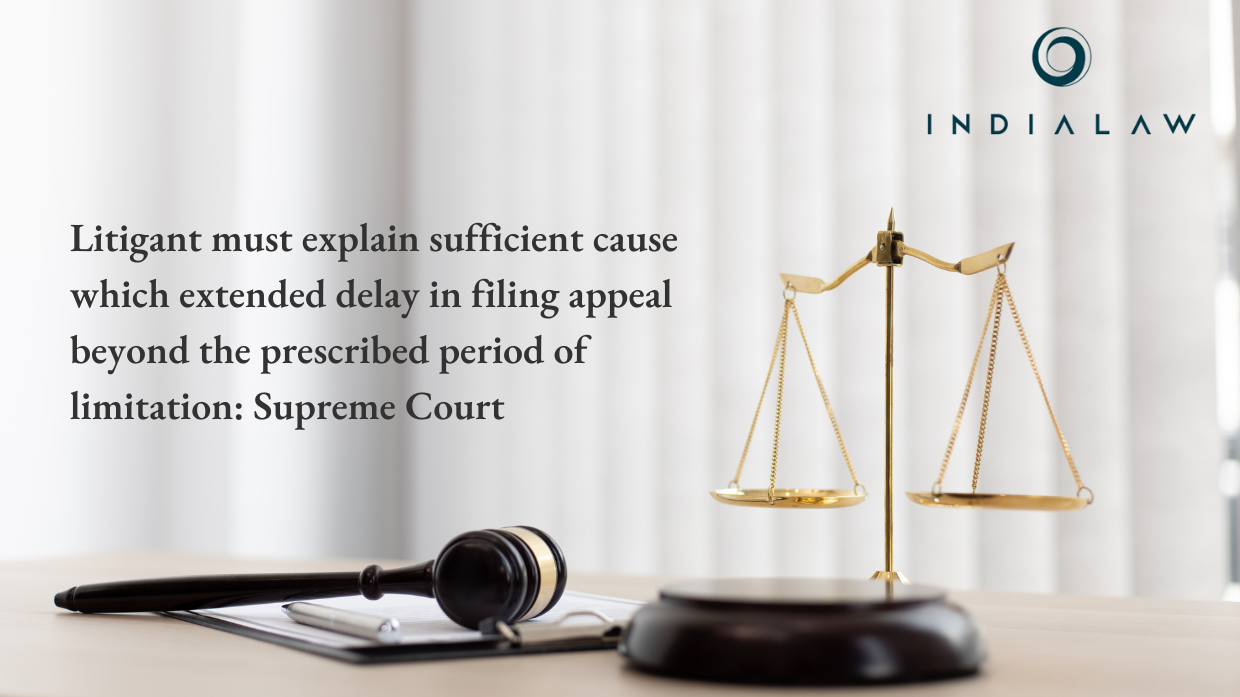Litigant must explain sufficient cause which extended delay in filing appeal beyond the prescribed period of limitation: Supreme Court

The usual manner in which litigating parties seek to condone delays in filing various proceedings, and explaining the delay in filing such proceeding only after the prescribed period of limitation, has been deprecated by the Hon’ble Supreme Court (“SC”) in a recent decision[i] on the matter. The SC was hearing an appeal filed by the State of Madhya Pradesh (“the State”) challenging the decision of the Hon’ble High Court of Madhya Pradesh (“HC”) rejecting the State’s second appeal on the ground that it was filed with inordinate delay of more than 5 years and no satisfactory reason had been provided for the same.
The present matter originated from a suit being filed by a person claiming declaration of title and permanent injunction in respect of certain government lands on the ground that he had been in possession of the lands since 1970 and had been given leasehold right by the Settlement Officer in the year 1989. The suit was dismissed by the Ld. Trial Court and decreed in favour of the State. Accordingly, the plaintiff sought challenge of such decision and the first appellate court held in his favour, decreeing against the State.
In this respect, the State challenged the decision of the first appellate court before the HC. However, the State filed the second appeal before the HC only after a period of more than 5 years after the decision of the first appellate court had been rendered. An interlocutory application seeking to condone such delay was also filed before the HC. It was observed that the reason given for such delay was due to the negligent actions on the part of the officials of the State first in informing the relevant departments regarding the decision of the first appellate court and thereafter the lethargy shown by the appropriate department of the State in permitting the filing of the second appeal. Such reasons prompted the HC to deny any reliefs to the State and the delay was not condoned. Challenging the decision of the HC, the State approached the SC.
The SC referred to the legal position in this regard and noted that when a particular proceeding or case has been filed before a court beyond the period of limitation, the petitioner has to explain to the court as to what was the ‘sufficient cause’ which prevented him to approach the court within limitation. The meaning of the term ‘sufficient cause’ was elaborated upon by referring to by referring to an earlier decision of the SC in the case of Ajay Dabra v. Pyare Ram[ii] and it was observed to mean an adequate and enough reason which prevented a party to approach the court within limitation. It was further observed that when a party is found to be negligent, or is found to have not acted diligently and remained inactive, a court is not justified to condone such delay by imposing conditions. The SC also relied upon an earlier decision in the case of Union of India v. Jahangir Byramji Jeejeebhoy (D) through his legal heir[iii], to state that delay should not be excused as a matter of generosity and that while rendering substantial justice by condoning delay, it must be ensured that there is no prejudice caused to the opposite party. Accordingly, the SC rejected the appeal filed by the State in the present matter and imposed exemplary costs of Rs.1,00,000/- (Rupees One Lakh Only) on the State.
As stated at the start, the SC also observed that it has become a trend and a general practice for parties to explain delay caused in pursuing the proceedings from the time when the limitation has expired. In this context, the SC has observed that the court is required to consider what came in the way of the party that it was unable to file it between the time prescribed for filing it. In this regard, it was held that a party must establish sufficient cause by also explaining the facts and circumstances that prevented it from filing the appeal earlier, right from when the time to file the appeal accrued. It was, thus, specified that any event or circumstance occurring after the period of limitation has expired cannot constitute sufficient cause and that though there may be events subsequent to when the limitation has expired, the delay has to be explained from the circumstances which occurred before such limitation expired.[iv]
In the opinion of the author, this decision is a timely reminder by the SC that delay in pursuing legal remedies by a litigating party must not be condoned for the sake of asking for it and that parties ought to be mindful of their rights in law and should not be negligent in acting upon them. The decision also helps elucidate that a party is expected to justify sufficient cause that prevented it in filing appeals right from when the right to file had accrued, which caused the delay to extend beyond the period of limitation.
[i] State of Madhya Pradesh v. Ramkumar Choudhary (2024 SCC OnLine SC 3612), decision dated 29th November, 2024. The coram comprised of J.B. Pardiwala and R. Mahadevan, JJ.
[ii] 2023 SCC OnLine SC 92, paragraph nos.13 and 14.
[iii] 2024 SCC OnLine SC 489, paragraph nos.24 to 27, 34 to 36.
[iv] See Ajit Singh Thakur Singh v. State of Gujarat [(1981) 1 SCC 495].
By entering the email address you agree to our Privacy Policy.



